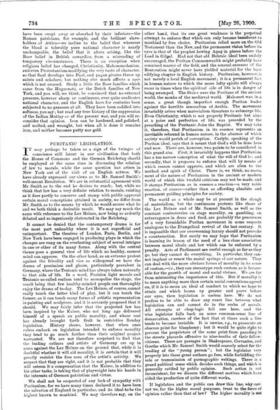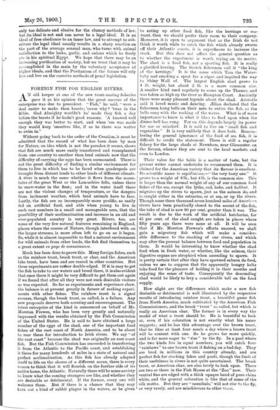PURITANIC LEGISLATION.
TT may perhaps be taken as a sign of the twinges of conscience still latent in our civilisation that both the House of Commons and the German Reichstag should be employed at the same time in discussing the relation of law to morals, while the same question has arisen in New York out of the visit of an English actress. We have already expressed our views as to Mr. Samuel Smith's well-meant Resolution. We are in substantial agreement with Mr. Smith as to the end he desires to reach; but, while we think that law has a very definite relation to morals, existing as it does partly to conserve and stamp with public approval certain moral conceptions attained in society, we differ from Mr. Smith as to the means by which he would secure what he and we both think a desirable result. We may say much the same with reference to the Len Heinze, now being so ardently debated and so ingeniously obstructed in the Reichstag.
It cannot be denied that the contemporary drama is for the most part unhealthy where it is not superficial and unimportant. The theatres of London, Paris, Berlin, and New York have been engaged in producing plays in which the changes are rung on the everlasting subject of sexual intrigue in one or other of its many forme. Along with the central theme goes a general view of life which no healthy, earnest mind can approve. On the other hand, as an extreme protest against the frivolity and vice so widespread we have the drama of pessimism and gloom, particularly prevalent in Germany, where the Teutonic mind has always taken naturally to that side of life. In a word, Parisian light morals and Teutonic so-called realism tend to monopolise the stage, the result being that few healthy-minded people can thoroughly enjoy the drama of to-day. The Len Heinze, of course, cannot really touch the latter kind of play, but it can touch the former, as it can touch many forms of artistic representation in painting and sculpture, and it is seriously proposed that it should. We may fairly infer that the projected law has been inspired by the Kaiser, who not long ago delivered himself of a speech on public morality, and whose zeal has already brought forth fruit in restrictive Sunday legislation. History shows, however, that when once rulers embark on legislation intended to enforce morality they fend to go much farther than their original project warranted. We are not therefore surprised to find that the leading authors and artists of Germany are up in arms against the Len Heinze on the ground that, while it is doubtful whether it will aid morality, it is certain that it will greatly restrict the free area of the artist's activity. We suspect that they are right, and it is not probable that they will esteem it a compensation that the Kaiser, in addition to his other tasks, is taking that of playwright into his hands in the interests of German patriotism and virtue.
We shall not be suspected of any lack of sympathy with Puritanism, for we have many times declared it to have been the salvation of England in particular, and its ideal to be the highest known to mankind. We may therefore say, on the other hand, that its one great weakness is the perpetual attempt to enforce that which can only become beneficent to mankind by free choice. Puritanism relied more on the Old Testament than the New, and the permanent vision before its eyes is that of the prophet hewing Agag in pieces before the Lord in G lige!. Had not that old Hebraic ideal been unduly encouraged, the Puritan Commonwealth might probably have remained master of the field, and the sensual excesses of the Restoration might never have yielded material for the least edifying chapter in English history. Puritanism, however, is not merely a local English movement; it is a permanent fact in human nature to which the more lofty spirits will always recur in times when the spiritual side of life is in danger of being swamped. The Stoics were the Puritans of the ancient world, the monks of the mediteval world. Mahomet was, in a sense, a great though imperfect enough Puritan leader against the horrible sensualism of Arabia. The movement invariably arises when materialism threatens to submerge life. Even Christianity, which is not properly Puritanic but aims at a poise and perfection of life, was preceded by the preaching of the Puritanic John the Baptist. We may take it, therefore, that Puritanism in its essence represents an inevitable rebound in human nature, in the absence of which society would perish of corruption. Carlyle, speaking of the Puritan ideal, says that it meant that God's will be done here and now. There are, however, two points to be considered in this grand aim. First, it invariably happens that Puritanism has a too narrow conception of what the will of God Is; and secondly, that it proposes to enforce that will by means of which reason cannot approve, and which are alien to the method and spirit of Christ. There is, we think, no move. ment of the nature of Puritanism in the ancient or modern world of which this twofold criticism may not be made, and it stamps Puritanism as in essence a reaction—a very noble reaction, of course—rather than as affording absolute and permanent guiding principles for society.
The world as a whole may be at present in the slough of materialism, but the continuous protests like those of the Len Heinze and of Mr. Samuel Smith, as well as the constant controversies on stage morality, on gambling, on extravagance in dress and food, are probably- the precursors of a very formidable Puritan movement in some respects analogous to the Evangelical revival of the last century. It is impossible that our overweening luxury should not provoke a counteraction. But surely we may hope that Puritanism is learning its lesson of the need of a less close association between moral ideals and law which can be enforced by a penalty. Acts of Parliament are useful enough as far as they go, but they cannot do everything. In particular, they can- not implant or renew the moral springs of our nature. They can deal with the more obvious forms of morality in its sense of custom,—i.e., they can stereotype such custom as is favour- able for the growth of moral and social virtues. We are far from minimising the importance of this. But if morality is to mean anything more than certain social conventions agreed on, if it is to mean an ideal of conduct to which we hope to attain and which looms up greater and purer before our eyes, then legislation is useless here. We do not profess to be able to draw any exact line between what legislation can and cannot do in the realm of morals. All attempts at chop-logic fail one here, and the wise legislator falls back on some common-sense line of demarcation, careless of the fact that at times such a line tends to become invisible. It is unwise, e.g., to prosecute an obscure print for blasphemy; but it would be quite right to prevent the proprietors of the same print from parading in the streets placards offensive to nine-tenths of their fellow- citizens. There are passages in Shakespeare, Cervantes, and Goethe which Mr. Samuel Smith would scarcely select for the reading of the "young person"; but the legislator very properly lets these great authors go free, while forbidding the sale or transmission of pornographic writings. There is a grand political sense which decides such things, and which is generally ratified by public opinion. Such action is not inconsistent, for we discern the different motives which have aided the production of quite different works.
If legislators and the public can draw this line, why can- not we, for the higher moral purposes, trust to the force of opinion rather than that of law? The higher morality is not only too delicate and elusive for the clumsy methods of law, but ita ideal is not and can never be a legal ideal. It is an ideal of free obedience to an inner law, and to attempt to sub- stitute the legal ideal usually results in a sharp reaction on the part of the average sensual man, who turns with animal satisfaction to the leeks, garlic, and onions which he freely ate in his spiritual Egypt. We hope that there may be an increasing purification of society, but we trust that it may be accomplished in the main by the voluntary acceptance of higher ideals, and that the Puritanism of the future will rely less and less on the coercive methods of penal legislation.







































 Previous page
Previous page